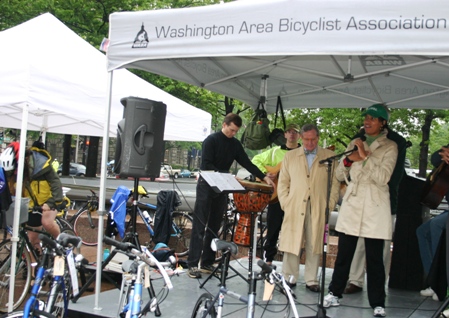
(Ward 4 Councilmember and Transportation Planning Board member Muriel Bowser speaks at Freedom Plaza)
–– Despite the rain, scores of bicyclists pedaled their way into 26 “pit stops” across the D.C. region, Friday, May 16, 2008, to support Bike to Work Day (BTWD) 2008.
Sponsored jointly by the Metropolitan Washington Council of Governments’ (COG) Commuter Connections program and the Washington Area Bicyclist Association (WABA), Bike to Work Day is held annually on the third Friday of May to cap off the national observation of Bike to Work Week.
With 7,000 registrants, Bike to Work Day in the Washington region boasts one of the largest celebrations in the country. The event brings together Washington-area commuters to promote bicycling to work as a healthy and environmentally-friendly alternative to drive-alone commuting.
“This event gets larger and larger every year and more people are embracing our message that bicycling is a healthy option to solo-driving; and in light of rocketing gas prices, it’s also far less expensive,” said Eric Gilliland, executive director of WABA.
The average price of regular gasoline in the Washington region is $3.75 per gallon and the region’s roads carry 1.2 million commuters each day. BTWD encouraged commuters to opt for bicycling not only to save costs, but also to help reduce traffic congestion and improve air quality in D.C., Maryland and Virginia.
“Our message hinges on the significance of reducing drive-alone commuting because it results in less crowded roads and cleaner air; bicycling is an excellent option to that end. We are thrilled to have again partnered with WABA to promote bicycling to work as a feasible commuting option,” said Nicholas Ramfos, director of Commuter Connections.
Master cyclists led convoys to the “pit stops” where riders were treated to refreshments, entertainment and opportunities to win prizes. Many of the event’s participants were experienced bicycle commuters, but a significant percentage of the 7,000 cyclists were novice. A 2008 survey of last year’s BTWD participants indicated that more than 20 percent of riders never commuted by bicycle before they participated in a BTWD event. “This tells us that the Bike to Work Day event really makes a quantifiable difference by getting people out of their cars for a day to try this cleaner and healthier form of getting to work”, said Ramfos. Adding, “Many of those individuals stick with it after the event and work bicycling into their routines; biking to work once a week, periodically or even full time if they get hooked”.
Many of the cyclists rode into downtown Washington D.C. and attended a bicycle rally at Freedom Plaza where Councilmembers Tommy Wells, Muriel Bowser and Jim Graham addressed the crowd.
Muriel Bowser, who is a Ward 4 Councilmember and also serves on the National Capital Region Transportation Planning Board, took to the podium in Freedom Plaza this morning to express her appreciation for the thousands of bicyclists who participated despite the rain. “Bike To Work Day is a wonderful opportunity to thank our region’s bicyclists for the smart transportation choices they make every day. Alternatives to drive-alone commuting, like biking and walking, reduce traffic, protect our environment, and improve the overall health of our residents,” said Councilmember Bowser.
Donations and sponsorships from companies such as HSBC Bank, ICF International, Crystal City BID and www.goDCgo.com helped make BTWD 2008 a success. Prizes included free T-shirts, road bikes and bicycle equipment. Although Bike to Work Day lasts for one day, Bike to Work Month will continue through the end of May and WABA and Commuter Connections will continue to reach out to drive alone commuters to encourage bicycling to work year round.
“Our primary aim is to educate commuters about the harmful effects of vehicle emissions and promote bicycling as a safe and healthy alternative. Sixty percent of the pollution created by cars occurs during the first minutes of operation, so when we give people a choice in how they commute, we are educating them to help the environment,” said Gilliland.
For more information about WABA, visit www.waba.org. To learn more about Commuter Connections, visit www.commuterconnections.org.